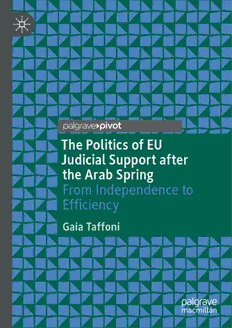
The Politics Of EU Judicial Support After The Arab Spring: From Independence To Efficiency PDF
Preview The Politics Of EU Judicial Support After The Arab Spring: From Independence To Efficiency
The Politics of EU Judicial Support after the Arab Spring From Independence to Efficiency Gaia Taffoni The Politics of EU Judicial Support after the Arab Spring Gaia Taffoni The Politics of EU Judicial Support after the Arab Spring From Independence to Efficiency Gaia Taffoni School of Transnational Governance European University Institute Florence, Italy ISBN 978-3-030-50772-5 ISBN 978-3-030-50773-2 (eBook) https://doi.org/10.1007/978-3-030-50773-2 © The Editor(s) (if applicable) and The Author(s), under exclusive licence to Springer Nature Switzerland AG 2021 This work is subject to copyright. All rights are solely and exclusively licensed by the Publisher, whether the whole or part of the material is concerned, specifically the rights of translation, reprinting, reuse of illustrations, recitation, broadcasting, reproduction on microfilms or in any other physical way, and transmission or information storage and retrieval,electronicadaptation,computersoftware,orbysimilarordissimilarmethodology now known or hereafter developed. The use of general descriptive names, registered names, trademarks, service marks, etc. in this publication does not imply, even in the absence of a specific statement, that such namesareexemptfromtherelevantprotectivelawsandregulationsandthereforefreefor general use. Thepublisher,theauthorsandtheeditorsaresafetoassumethattheadviceandinforma- tion in this book are believed to be true and accurate at the date of publication. Neither the publisher nor the authors or the editors give a warranty, expressed or implied, with respecttothematerialcontainedhereinorforanyerrorsoromissionsthatmayhavebeen made.Thepublisherremainsneutralwithregardtojurisdictionalclaimsinpublishedmaps and institutional affiliations. Cover credit: © Melisa Hasan This Palgrave Macmillan imprint is published by the registered company Springer Nature Switzerland AG The registered company address is: Gewerbestrasse 11, 6330 Cham, Switzerland Preface This book is the final product of three years of research spent among the Network for the Advancement of Social and Political Studies at the University of Milan, the Centre for European Studies at Queen Mary University London and at the School of Public Policy at University College London. The book draws extensively from my doctoral thesis, in particular part of Chapter 3 and Chapter 4 have appeared in the article Supporting Rule of Law from Abroad: A comparative assessment of two post-Arab Spring judicial reforms published in the Italian Political Science Review in July 2019. This work reflects my interest in the processes of change happening in the Southern Mediterranean region at the level of judicial institutions. Focusing consistently on the mechanisms that trigger transformations in a soft way, this book is a first attempt in understanding the power that shared norms and ideas have in the processes of policy transformation. Inparticular,theoriginalpuzzlethatgeneratedtheresearchconducted in this book is the event—or the sum of interlocked events—that took place in the MENA region in 2011, namely the ‘Arab Spring’. That impetus for change happening at the borders of the EU increased the attention of international donors in supporting the democratic reforms taking place in some countries in that area. Despite the importance and the relevance of the situation, the dynamics of the European influence onthereformstakingplaceinthosecountrieswasstillpoorlyunderstood v vi PREFACE whenIstartedmyPh.D.Havetechnicalaids,financialsupportsandsocial- izationmechanismssetupbyEuropeanexpertsinhybridregimesencour- aged the efforts for democratization? What is the extent to which EU standardsandpracticesonjusticehavepenetratedincountriesundergoing processesofinstitutionalreforms?Whathasbeentheroleplayedbyactors, andinparticular,whoarethenormentrepreneurs thathavedrivenchanges at the judicial level? This book is the result of numerous encounters and exchanges with scholars and experts that helped me in confronting with thosecompellingquestions.Forthisreason,Iwishtoextendmygratitude to those who have shared their ideas with me in the past years and have had an impact on my intellectual understanding. I would like to thank in particularProfessorGianpieroCamaandProfessorDanielaPianafortheir support in the design of this research. I am also grateful for the expert advice of Professor Carlo Guarnieri, Dr. Sarah Wolff, Professors Barbara Pisciotta and Francesco Raniolo; my warm thanks also go to Professor ClaudioRadaelliforhisinterestandsupportinthefinalstepsofmywork. London, UK Gaia Taffoni Contents 1 Promoting Justice in the Southern Mediterranean 1 2 The Nature of EU Judicial Support in the Southern Neighbourhood: Exploring Sectoral Cooperation 61 3 Morocco: Judicial Changes Between European and Domestic Models 91 4 Jordan: Little Steps Towards a Reformed Judiciary 111 5 Limitations and Possibilities of Externally Supported Judicial Reforms 131 Index 143 vii Abbreviations CCJE Consultative Council of European Judges CEECs Central and Eastern European Countries CSM Conseil Supérieur de la Magistrature CSPJ Conseil Supérieur du Pouvoir Judiciaire EU European Union ICJ International Commission of Jurists ICT Information Communication Technology ISM Institut Supérieur de la Magistrature JHA Justice and Home Affairs MENA Middle East and North Africa NPM New Public Management US United States ix List of Tables Table 1.1 The institutional dimension 17 Table 1.2 The managerial dimension 23 Table 1.3 Background commonalities 27 Table 1.4 Overview: EU economic relations with Morocco and Jordan 28 Table 1.5 Characteristics of the judicial council in Morocco before and after the reforms 35 Table 1.6 Characteristics of the judicial council in Jordan before and after the reforms 37 Table 1.7 Measurement of the Judicial Councils’ strengths 38 Table 2.1 Categories and related words for text analysis 65 Table 2.2 Percentage for each word and each cluster of words in the texts analysed 69 Table 2.3 European model of judicial promotion 73 Table 2.4 ENPI/ENI programmes of judicial support in Morocco 74 Table 2.5 ENPI/ENI programmes of judicial support in Jordan 75 Table 2.6 Overview of Southern ENP Judicial support’s objectives: Twinning 83 Table 2.7 General overview of Southern ENP Judicial support’s objectives: TAIEX 84 Table 3.1 Comparative timeline—Morocco’s judicial reforms and European inputs 99 Table 3.2 Overview of the ISM project 104 Table 3.3 Theinternal/externalmodelappliedtoMoroccanjudicial reforms 107 xi xii LIST OF TABLES Table 4.1 Timeline–Jordan’s judicial reforms and European inputs 119 Table 4.2 Overview, single projects and types of intervention of judicial support in Jordan 121 Table 4.3 European projects and observed domestic changes 124 Table 4.4 The internal/external model applied to Jordan’s judicial reforms 126 Table 5.1 Morocco and Jordan in comparative perspective: the institutional dimension 136 Table 5.2 Summary—Morocco and Jordan’s main judicial managerial changes 138
